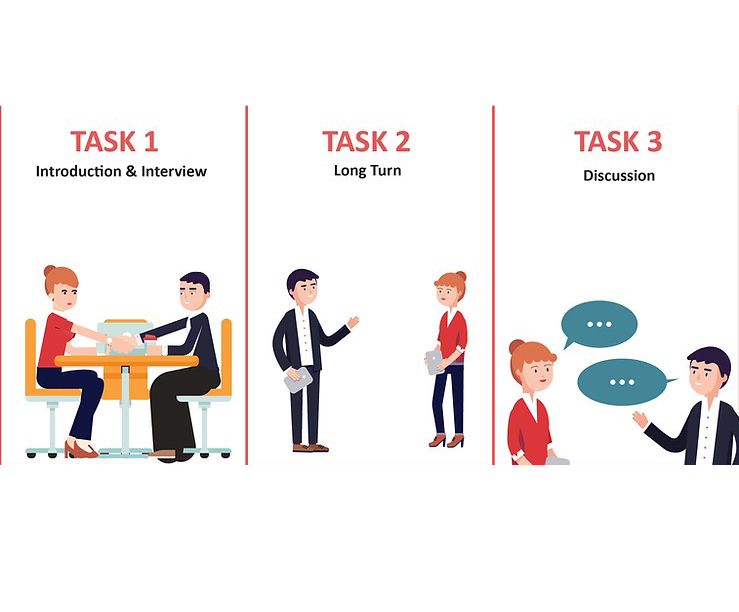IELTS Speaking Cue Card 2024: Topics, With Sample Answers

- If you plan to study, work or migrate to an English-speaking country, you might have heard of the International English Language Testing System or IELTS exam. It is the world’s most trusted English test and the best choice for governments, universities and employers globally. In India alone, 1.3 to 1.4 million people take the IELTS test annually.
- Popular English-speaking countries like Australia, the USA, the UK, Canada, and New Zealand recognise the IELTS Exam as an essential measure of English language proficiency. With 3 million tests booked worldwide annually, it is safe to say that the IELTS exam is the go-to choice. Additionally, there are four modules in the exam, each of which tests different language skills namely
- Reading
- Writing
- Speaking
- Listening
- IELTS Speaking Test
- Administrative Authority : IDP India
- Duration : 11-14 minutes
- Parts : 3 Parts
- Total Band Score : 0-9
- Syllabus : Same for general and academic
- What is an IELTS Cue Card?
An IELTS Cue Card is a prompt used in the Speaking section of the IELTS exam. It is given to candidates in Part 2 of the Speaking test, often referred to as the “long turn.” The cue card contains a topic that the candidate must speak about for 1-2 minutes. It includes several bullet points to guide the response, helping candidates structure their talk.
Here’s how the process works:
- Presentation of the Cue Card: The examiner hands the candidate a cue card with a specific topic and several sub-points. The candidate also receives a pencil and paper to make notes.
- Preparation Time: The candidate is given 1 minute to prepare. During this time, they can take notes on the paper provided.
- Speaking Time: The candidate then speaks about the topic for 1-2 minutes. The examiner may ask one or two follow-up questions after the candidate finishes speaking.
- Bullet Points: The cue card includes 3-4 bullet points to help structure the response. Candidates are encouraged to address these points, but they are also free to add any relevant information they feel is necessary.
- Parts of the IELTS Speaking Test
The IELTS Speaking Test is divided into three parts, each designed to assess different aspects of a candidate’s speaking ability. Here is an overview of each part:

Part 1: Introduction and Interview (4-5 minutes)
- In this part, the examiner introduces themselves and asks the candidate to introduce themselves and confirm their identity. The examiner then asks general questions about familiar topics such as home, family, work, studies, and interests. The purpose is to make the candidate feel comfortable and to assess their ability to communicate in everyday situations.
Part 2: Long turn (3-4 minutes)
- In Part 2, the candidate is given a cue card with a topic and is asked to speak about it for 1-2 minutes. The cue card includes prompts to help the candidate structure their response. The candidate has 1 minute to prepare and can make notes if they wish. After the candidate speaks, the examiner may ask one or two follow-up questions.
Part 3: Discussion (4-5 minutes)
- In the final part, the examiner and the candidate engage in a discussion related to the topic from Part 2. The questions are more abstract and analytical, requiring the candidate to express opinions, justify arguments, and discuss broader issues. This part assesses the candidate’s ability to discuss complex ideas and hold a conversation.
Overall Assessment Criteria
- Throughout the speaking test, candidates are assessed based on four criteria:
- Fluency and Coherence: Ability to speak smoothly and logically.
- Lexical Resource: Range and accuracy of vocabulary used.
- Grammatical Range and Accuracy: Correct use of grammar structures.
- Pronunciation: Clarity and naturalness of pronunciation.
- Top 10 IELTS Speaking Cue Card Topic With Sample 9Answers
Here are ten potential IELTS Speaking Cue Card topics for May to August 2024, along with sample answers for each:
1. Describe a person who inspired you.
You should say:
- Who the person is
- How you know them
- What they have done to inspire you
- And explain how they inspired you.
Sample Answer: A person who inspired me is my high school teacher, Mr. Thompson. I met him during my sophomore year when he taught my history class. He had a unique way of making history come alive with stories and engaging discussions. What inspired me the most was his dedication to his students and his passion for teaching. He encouraged me to think critically and pursue my interests with vigor. His support and guidance helped me gain confidence and shaped my career path in education.
2. Describe a time when you had to make a difficult decision.
You should say:
- What the decision was
- Why it was difficult
- What you decided
- And explain how you felt about the decision.
Sample Answer: A difficult decision I had to make was choosing between two job offers. One was a well-paying corporate job, while the other was a lower-paying position at a non-profit organization that aligned with my values. It was difficult because the corporate job offered financial stability, but the non-profit job was more fulfilling. I decided to take the non-profit job because I believed in its mission. Although it was financially challenging at times, I felt satisfied and happy with my choice.
3. Describe a place you would like to visit in the future.
You should say:
- Where it is
- Why you want to visit it
- What you know about this place
- And explain what you would like to do there.
Sample Answer: I would like to visit New Zealand in the future. I’ve always been fascinated by its stunning landscapes and outdoor activities. I want to visit it because it offers diverse natural beauty, from mountains and beaches to forests and lakes. I know that New Zealand is also famous for its Maori culture and adventure sports. I would love to go hiking in the Southern Alps, visit the Hobbiton movie set, and learn more about the Maori traditions. It would be an adventure of a lifetime.
4. Describe a piece of art (a painting, sculpture, etc.) that you like.
You should say:
- What the piece of art is
- Where and when you saw it
- What it looks like
- And explain why you like it.
Sample Answer: A piece of art that I like is “Starry Night” by Vincent van Gogh. I saw it at the Museum of Modern Art in New York City last summer. The painting depicts a night sky filled with swirling stars and a bright crescent moon over a quiet town. I like it because of its vibrant colors and dynamic brushstrokes, which convey a sense of movement and emotion. The painting’s beauty and van Gogh’s unique style always captivate me.
5. Describe a memorable event in your life.
You should say:
- What the event was
- When and where it happened
- Who was there
- And explain why it was memorable.
Sample Answer: A memorable event in my life was my college graduation. It took place two years ago at my university’s main hall. My family, friends, and professors were all there to celebrate. The ceremony marked the culmination of years of hard work and dedication. It was memorable because it symbolized the beginning of a new chapter in my life. Walking across the stage to receive my diploma, I felt a profound sense of achievement and pride.
6. Describe a hobby you enjoy.
You should say:
- What the hobby is
- How you started it
- How often you do it
- And explain why you enjoy it.
Sample Answer: One hobby I enjoy is gardening. I started it three years ago when I moved to a house with a backyard. I usually spend a few hours each weekend tending to my plants. I enjoy it because it’s a peaceful and rewarding activity. Watching my plants grow and bloom gives me a sense of accomplishment. It’s also a great way to relax and connect with nature.
7. Describe a traditional festival in your country.
You should say:
- What the festival is
- When and where it is celebrated
- How it is celebrated
- And explain why it is important.
Sample Answer: One traditional festival in my country is Diwali, the Festival of Lights. It is celebrated in October or November, depending on the lunar calendar. Diwali is celebrated all over India with great enthusiasm. People decorate their homes with oil lamps, candles, and rangoli designs. Fireworks light up the sky, and families exchange gifts and sweets. Diwali is important because it symbolizes the victory of light over darkness and good over evil. It’s a time for family gatherings and spreading joy.
8. Describe a time when you learned something new.
You should say:
- What you learned
- How you learned it
- When you learned it
- And explain how you felt about learning it.
Sample Answer: I recently learned how to play the guitar. I started taking lessons online during the pandemic lockdown. I practiced every day for about six months. Learning to play the guitar was challenging at first, but I gradually improved. I felt a great sense of satisfaction as I mastered different chords and songs. It’s been a wonderful experience, and I’m proud of my progress.
9. Describe a goal you have achieved.
You should say:
- What the goal was
- How you achieved it
- How long it took to achieve
- And explain how you felt after achieving it.
Sample Answer: A goal I achieved was completing a marathon. I decided to run a marathon last year, and it took me six months of rigorous training to prepare. I followed a strict schedule, gradually increasing my running distance each week. Achieving this goal required a lot of discipline and perseverance. Crossing the finish line was an incredible feeling. I felt a sense of accomplishment and pride in pushing my physical and mental limits.
10. Describe an important change in your life.
You should say:
- What the change was
- When it happened
- How it happened
- And explain why it was important.
Sample Answer: An important change in my life was moving to a new city for a job. This happened two years ago when I got a job offer from a reputable company. I had to leave my hometown and relocate to a city where I didn’t know anyone. The change was challenging at first, as I had to adjust to a new environment and make new friends. However, it was an important step for my career growth and personal development. It taught me to be more independent and adaptable.
- Tips for Acing IELTS Speaking Cue Card Round
1. Understand the Cue Card
- Read Carefully: Take a few seconds to read the cue card thoroughly. Understand the main topic and the bullet points.
- Identify Key Points: Make sure you cover each of the bullet points during your talk.
2. Use Preparation Time Wisely
- Make Notes: Use the 1 minute to jot down key ideas or words that will help you remember what to say.
- Plan Structure: Quickly outline the structure of your talk, including an introduction, main points, and a conclusion.
3. Practice Fluency
- Keep Talking: Aim to speak for the full 2 minutes. If you run out of things to say, elaborate on your points with examples or related ideas.
- Avoid Long Pauses: Try not to have long pauses or hesitations. Use fillers like “well,” “you know,” or “actually” to keep the flow.
4. Stay Relevant
- Stick to the Topic: Make sure your response stays on topic and addresses all parts of the cue card.
- Expand on Points: Provide detailed explanations and examples to illustrate your points.
5. Use a Range of Vocabulary and Grammar
- Variety: Use a range of vocabulary to demonstrate your language skills. Avoid repeating the same words.
- Complex Sentences: Use a mix of simple and complex sentences. Show your ability to use different grammatical structures.
6. Focus on Pronunciation
- Clarity: Speak clearly and at a moderate pace. Make sure your pronunciation is understandable.
- Intonation: Use natural intonation and stress patterns to make your speech more engaging.
7. Practice with Timed Sessions
- Simulate Test Conditions: Practice speaking on different cue cards for 2 minutes, followed by 1 minute of preparation time.
- Record Yourself: Record your practice sessions to evaluate your fluency, coherence, and pronunciation.
8. Stay Calm and Confident
- Relax: Take a deep breath before you start speaking. Confidence will help you perform better.
- Positive Attitude: Approach the cue card as an opportunity to share your thoughts and experiences.
9. Engage with the Examiner
- Eye Contact: Maintain eye contact with the examiner to appear confident and engaged.
- Body Language: Use natural gestures to emphasize your points and appear more animated.
10. Learn from Feedback
- Seek Feedback: Practice with a teacher or a study partner who can give you constructive feedback.
- Improve: Use the feedback to identify areas of improvement and work on them.
By following these tips and practicing regularly, you can improve your performance in the IELTS Speaking Cue Card round.
Conclusion
- Alright, let’s wrap this up with a bang! Mastering the IELTS cue card is no easy feat, but with the right strategies and a sprinkle of confidence, you’ll be unstoppable. Remember, the key is to embrace the challenge, channel your inner wordsmith, and let your unique personality shine through.
OTHER CUE CARDS:
- Describe your Favourite Singer: IELTS Cue Card
- Describe A Café You Like To Visit Cue Card
- Describe a Long Car Journey You Went On
- Describe A Person Who Wears Unusual Clothes
- Describe Your First Day At School IELTS Cue Card
- Describe a Time When You Observed The Stars
- Describe a difficult thing you did with the IELTS Cue Card
- Describe a Chocolate You Didn’t Like: IELTS Speaking Cue Card
- Describe a Daily Routine That You Enjoy IELTS Cue Card
- Describe a Skill That you can teach other people
- Describe a Place you Visited Where the Air was Polluted
- Describe a Famous Person that you are Interested in
- Describe a Course That You Want to Learn
- Describe a Person who Solved a Problem in Smart Way
- Describe a Prize That You Received
- Describe a Volunteering Experience You Have Had
- Describe a Piece of Good News
- Describe Something you Taught to Your Friend
- Talk About an Interesting Old Person you Met Recently
- Describe a Dinner you Really Enjoyed
- Describe a Story or Novel That Was Interesting to You
- Describe a Time When you Shared Something with Others
- Describe a Toy you Liked in Childhood
- Describe an Interesting Neighbour
- Describe a Competition You Would Like to Take Part In
- Describe an interesting activity that you remember enjoying most in your Primary School
- Describe Your Childhood Friend
- Describe an Object You Find Particularly Beautiful
- Describe a Place Where you are Able to Relax
- Describe a person you know who likes to talk a lot
- Describe a place where you would like to go to relax
- Describe a period when you were busy
- Describe a long-term goal you would like to achieve
- Describe a situation when you helped someone
- Describe a job you would not like to do in the future
- Describe a time when you used a map
- Describe a skill that you learned in your childhood
- Describe an unusual holiday you had
- Describe an exciting activity that you experienced with someone else
- Describe a person who is good at making people feel welcome in his/her home
- Describe A Time You Successfully Did Something Difficult
- Describe Something in Your Country That You Are Interested In
- Describe a Beautiful City
- Describe something you do regularly that helps you work and study better
- Describe a photo that you took and are proud of
- Describe a party that you enjoyed
- Describe a useful object in your home that you can’t live without
- Describe a good advertisement that you think is useful
- Describe an occasion when someone or something made noise
- Describe a sportsperson that you admire
- Describe something that you picked up that was thrown by someone else
- Describe a time that something changed your life in good ways






